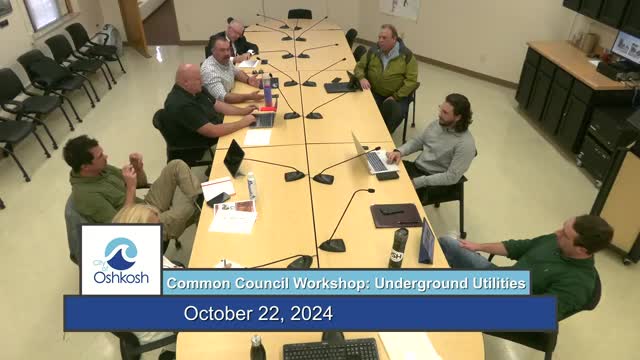City Officials Discuss Infrastructure Resilience Amid Climate Change Challenges
October 23, 2024 | Oshkosh City, Winnebago County, Wisconsin
This article was created by AI summarizing key points discussed. AI makes mistakes, so for full details and context, please refer to the video of the full meeting. Please report any errors so we can fix them. Report an error »

During the Oshkosh Common Council Workshop held on October 22, 2024, discussions centered on the undergrounding of utilities, a topic that has significant implications for the city's infrastructure and resilience against climate change. Council members and city officials explored the potential benefits and challenges of transitioning overhead utility lines to underground systems, particularly in light of increasing environmental concerns and the need for a more robust infrastructure.
One key point raised during the meeting was the importance of identifying critical infrastructure lines that, if damaged, could impact not only the city but also surrounding developments. This consideration is crucial as Oshkosh aims to position itself as a resilient city, especially as climate change drives demand for cooler locations for data centers and other businesses. The discussion highlighted the need for a strategic approach to utility management, ensuring that essential services remain operational during adverse weather events.
The conversation also touched on the interconnectedness of utility systems. Representatives from Wisconsin Public Service (WPS) emphasized their efforts to create a more looped system, akin to water supply networks, to mitigate the risks associated with outages. However, concerns were raised about specific areas, such as Ninth Avenue, where connectivity may be lacking, potentially leading to more extensive service interruptions.
While some council members expressed skepticism about the aesthetic benefits of undergrounding utilities, they acknowledged the importance of system resiliency. The potential for prolonged outages—lasting days rather than hours—was identified as a significant concern, particularly in an increasingly digital world where connectivity is vital.
Financial implications were also a major topic of discussion. The estimated costs for homeowners to prepare their properties for underground utilities ranged from $3,000 to $6,000, raising questions about the affordability and feasibility of such initiatives. Some council members cautioned against relying heavily on grants and government funding, suggesting that a more sustainable approach to financing infrastructure improvements is necessary.
In conclusion, the workshop underscored the complexities surrounding the undergrounding of utilities in Oshkosh. As the city navigates these challenges, the discussions highlighted the need for a balanced approach that considers both the immediate financial impacts and the long-term benefits of a resilient infrastructure. The council's ongoing deliberations will be crucial in determining the future of utility management in Oshkosh, with a focus on enhancing community resilience in the face of climate change.
One key point raised during the meeting was the importance of identifying critical infrastructure lines that, if damaged, could impact not only the city but also surrounding developments. This consideration is crucial as Oshkosh aims to position itself as a resilient city, especially as climate change drives demand for cooler locations for data centers and other businesses. The discussion highlighted the need for a strategic approach to utility management, ensuring that essential services remain operational during adverse weather events.
The conversation also touched on the interconnectedness of utility systems. Representatives from Wisconsin Public Service (WPS) emphasized their efforts to create a more looped system, akin to water supply networks, to mitigate the risks associated with outages. However, concerns were raised about specific areas, such as Ninth Avenue, where connectivity may be lacking, potentially leading to more extensive service interruptions.
While some council members expressed skepticism about the aesthetic benefits of undergrounding utilities, they acknowledged the importance of system resiliency. The potential for prolonged outages—lasting days rather than hours—was identified as a significant concern, particularly in an increasingly digital world where connectivity is vital.
Financial implications were also a major topic of discussion. The estimated costs for homeowners to prepare their properties for underground utilities ranged from $3,000 to $6,000, raising questions about the affordability and feasibility of such initiatives. Some council members cautioned against relying heavily on grants and government funding, suggesting that a more sustainable approach to financing infrastructure improvements is necessary.
In conclusion, the workshop underscored the complexities surrounding the undergrounding of utilities in Oshkosh. As the city navigates these challenges, the discussions highlighted the need for a balanced approach that considers both the immediate financial impacts and the long-term benefits of a resilient infrastructure. The council's ongoing deliberations will be crucial in determining the future of utility management in Oshkosh, with a focus on enhancing community resilience in the face of climate change.
View full meeting
This article is based on a recent meeting—watch the full video and explore the complete transcript for deeper insights into the discussion.
View full meeting
